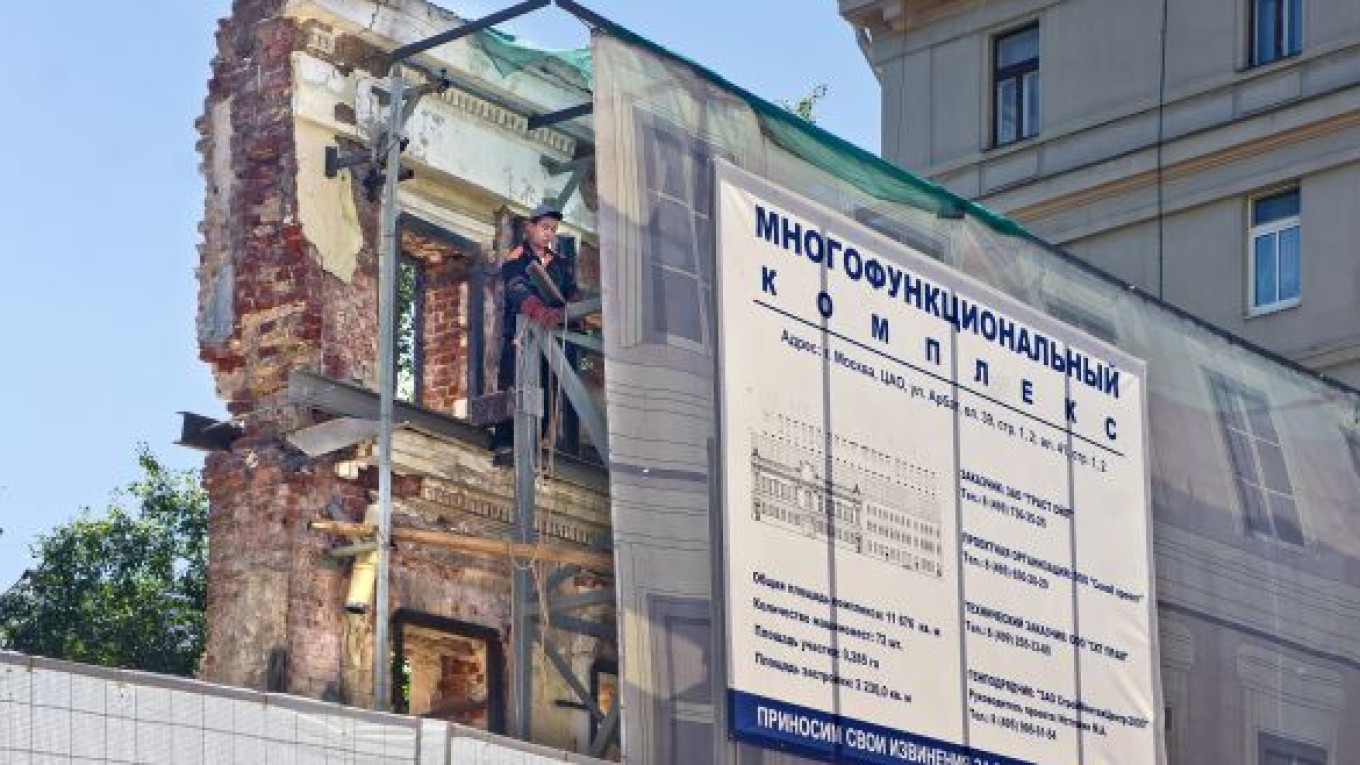In the middle of the Arbat, there is a crumbling wall behind a graffitied construction fence. The scene around the site seemed quiet Monday morning, but mistakenly so. This wall, which does not seem immediately noteworthy among the other construction works taking place on the street, is the focus of the latest conflict over the demolition of historical landmarks in Moscow.
Members of the architectural preservation group Arkhnadzor say that the demolishers of the Melgunov house, which was built on 41 Arbat in 1778, are not only acting illegally but also threatening the foundations of the surrounding historical buildings.
They are acting "as if they don't recognize the existence of the state," said Arkhnadzor coordinator Natalya Samover. "We are one step away from the declaration of an independent republic of Arbat."
The investor Trust Oil and general contractor StroiMontazhTsentr-2000 are demolishing the Melgunov house to make way for a multifunctional center, complete with shopping areas, prime residences and 72 parking spots, according to a bulletin hanging on the construction site.
But activists say the companies are ignoring municipal rules about building on historical sites.
The house on the Arbat, which first served as the residence of Lieutenant Nikolai Melgunov, is not registered as a historical monument but is located in a historical zone, which gives it some municipal protections. The rules about these zones state that developers can only build houses that match the parameters of their historical predecessors, but the companies demolishing the Melgunov house also plan to add two floors and underground parking to the site.
Arkhnadzor said in an Aug. 7 statement that the companies are tearing down the Melgunov house without the permission of the demolition commission, a state organization that oversees the liquidation of historical buildings. Moscow's cultural heritage department has since stopped the works and hit StroiMontazhTsentr-2000 with a 200,000 ruble ($6,300) fine, according to the department's statement. However, Samover said that works resumed after Aug. 8.
Arkhnadzor members say the demolition threatens not only the historical Melgunov house, but also the legendary Melnikov house, which is 50 meters away from the future construction site. Residents of another two neighboring cultural landmarks, including the former home of poet Bulat Okudzhava, say they have started to see cracks in their walls and floors because of the rough demolition work.
StroiMontazhTsentr-2000 and Trust Oil did not comment on this report.
Moscow continues to lose a large number of historical buildings each year even though it has some of the harshest laws in Europe to protect these sites, said Alexander Kibovsky, head of the cultural heritage department, in March. The intensity of building in the historical center of Moscow in the past 20 years equaled construction in this area throughout all the years of Soviet rule, he said.
The city launched a five-year initiative with a price tag of 17.7 billion rubles this year to protect cultural heritage sites. But Samover said that the laws and projects are not enough if there is no political will to stop developers with too much leverage over the government.
Samover said she is hopeful that the influential Arbat residents who paid up to $4 million for residences on nearby Krivoarbatsky Pereulok will stand up against the demolition to protect the value of their properties.
"This is not a simple neighborhood. Influential people live here," Samover said. "I hope that they will open up a second front in this battle."
A Message from The Moscow Times:
Dear readers,
We are facing unprecedented challenges. Russia's Prosecutor General's Office has designated The Moscow Times as an "undesirable" organization, criminalizing our work and putting our staff at risk of prosecution. This follows our earlier unjust labeling as a "foreign agent."
These actions are direct attempts to silence independent journalism in Russia. The authorities claim our work "discredits the decisions of the Russian leadership." We see things differently: we strive to provide accurate, unbiased reporting on Russia.
We, the journalists of The Moscow Times, refuse to be silenced. But to continue our work, we need your help.
Your support, no matter how small, makes a world of difference. If you can, please support us monthly starting from just $2. It's quick to set up, and every contribution makes a significant impact.
By supporting The Moscow Times, you're defending open, independent journalism in the face of repression. Thank you for standing with us.
Remind me later.


